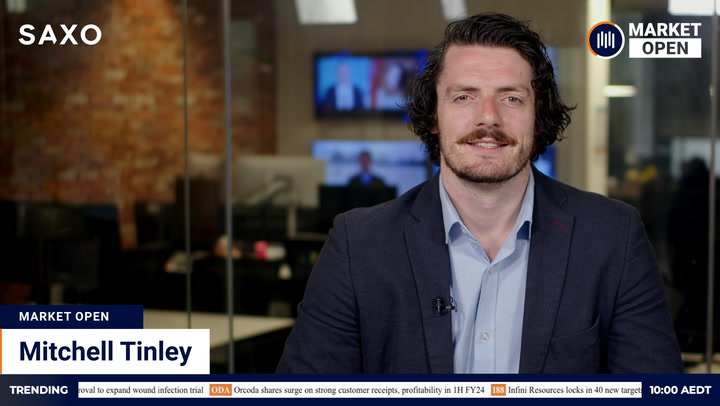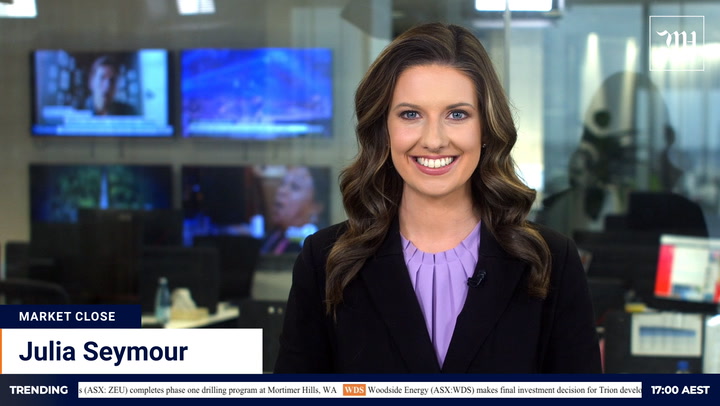Australian shares face early pressure following a third straight decline in US stocks and falls in key commodities after the Federal Reserve warned growth had slowed.
ASX futures sank 35 points or 0.47 per cent. The S&P/ASX 200 fell yesterday for the first time in four sessions, shedding 0.24 per cent despite a late comeback.
Overnight, iron ore dropped more than 3 per cent. A rising US dollar weighed on gold and copper. Oil found support in the destructive after-effects of Hurricane Ida.
Wall Street
The S&P 500 and Dow Jones Industrial Average logged their third straight losses as investors reassessed the likely pace of economic growth as the delta variant depresses activity.
The S&P 500 eased six points or 0.13 per cent. The Dow shed 69 points or 0.2 per cent. The Nasdaq Composite fell 88 points or 0.57 per cent to its first loss in five sessions.
The Federal Reserve warned economic growth had “downshifted slightly to a moderate pace”.
“The deceleration in economic activity was largely attributable to a pullback in dining out, travel, and tourism in most Districts, reflecting safety concerns due to the rise of the Delta variant, and, in a few cases, international travel restrictions,” the central bank noted in its ‘Beige Book’ of economic commentary.
The bank said inflationary pressures remained elevated. Half of the Fed’s 12 districts reported “strong” pressure on prices, and half “moderate” pressure.
Stocks have retreated this month after weak employment figures sharpened growth concerns, bond yields rallied and investors fretted about seasonal pressures. September and October have historically been more prone to market pullbacks than other months.
The Dow has fallen 0.9 per cent so far in September. The S&P 500 and Nasdaq are off 0.2 per cent. The S&P 500 has put on more than 20 per cent this year without experiencing a significant correction.
“We see a bumpy September-October as the final stages of a mid-cycle transition play out,” Morgan Stanley chief cross-asset strategist Andrew Sheets said. “The next two months carry an outsized risk to growth, policy and the legislative agenda.”
Apple and Facebook were the biggest drags on the S&P 500 and Nasdaq, falling 1 and 1.2 per cent, respectively. Tech stocks lost support as bond yields retreated. Defensive sectors were the night’s best performers.
“I think markets are becoming a bit more defensive over the past couple of days,” James Ragan, D.A. Davidson director or wealth management research, told MarketWatch.
“We’re seeing some outperformance in traditionally defensive sectors, including utilities and consumer staples, and less participation from the tech sector.”
Australian outlook
Dip-buyers will have another opportunity to test their convictions with yet another soft start ahead. It’s Groundhog Day for the S&P/ASX 200, which is stuck in a pattern of weak opens, followed by session-long recoveries.
The index has fallen sharply for the last three sessions, only to finish near its starting point. Yesterday was the first day this week the index did not close higher.
Bond proxies cushioned Wall Street from a deeper loss as treasury yields backed off eight-week highs. Utilities gained 1.79 per cent, consumer staples 0.78 per cent and real estate 0.55 per cent.
Cyclical sectors have been under pressure all week. Energy dropped 1.3 per cent and materials 1.02 per cent. Financials eased 0.34 per cent.
Chinese inflation figures are due at 11.30 am AEST. RBA Governor Guy Debelle is scheduled to address an online event at 6.35 pm AEST.
Dividends: Nine Entertainment, South32 and Monadelphous are among companies going ex-dividend this session.
IPOs: none today after the Copper Search listing was pushed back until next Wednesday.
The dollar declined 0.28 per cent to 73.66 US cents.
Commodities
Iron ore continued to zig-zag lower, with buying activity depressed by a Chinese clampdown on steel output. The steel industry accounts for 15 per cent of the nation’s carbon footprint, according to the Xinhua news agency. China has committed to achieving carbon neutrality by 2060.
The spot price for ore landed at Tianjin fell US$4.80 or 3.5 per cent to US$133.05 a tonne. BHP‘s US-listed stock declined 1.53 per cent and its UK-listed stock 1.3 per cent. Rio Tinto lost 1.35 per cent in the US and 1.03 per cent in the UK.
Oil firmed amid reports output from the Gulf of Mexico will be slow to recover from the hit from Hurricane Ida. Brent crude settled 91 US cents ahead at US$72.60 a barrel.
“It’s clear that the storm was one of the most damaging on record for offshore oil and gas production, as well as import/export terminals and refineries in Louisiana,” Robbie Fraser, global research & analytics manager at Schneider Electric, said.
Gold fell for a second day as a strengthening dollar depressed interest in alternative stores of wealth. Metal for December delivery settled US$5 or 0.3 per cent lower at US$1,793.50 an ounce. The NYSE Arca Gold Bugs Index dipped 0.22 per cent.
Aluminium hovered near a decade high as traders assessed the impact of a military coup in Guinea, a major supplier of bauxite to China. Benchmark aluminium on the London Metal Exchange firmed 1.4 per cent to US$2,777.35 a tonne. Copper fell 1.1 per cent and lead 0.4 per cent. Nickel firmed 1 per cent, zinc 0.5 per cent and tin 0.9 per cent.







